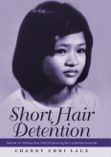Em was still recovering in the sick-house when the Black Uniform came to take me away from my parents. I was gathering rice under the hot sun when I saw two Black Uniforms and the village chief marching toward the field. I shrank down to the ground, wishing I could disappear. I watched them call out a few boys and girls from the field to get in line behind them. Hoping they thought I was too young to go, I turned away from them to put a bundle of rice stalks onto a stack, but it was too late.
They called out to me, “Comrade by the stack, you need to come with us.” I felt so light, as if I could float above the ground. As if I was hypnotized, I followed their commands. “You can leave the curved knife with the mothers and the fathers here.”
I looked for Pa, but he would not let me see him, just like when Chenda was forced to leave. He could not bring himself to acknowledge the separation. He continued working as if nothing was happening. I wanted to call out to him, but I was afraid the Black Uniforms would see me cry. The girls and boys were supposed to be happy and grateful to the Black Uniforms for freeing us from the old regime, our parents. I scanned the field, hoping to see Mair and Ouv. When I found them, they looked like they had seen a ghost. I locked eyes with Mair in desperation crying the silent words, Tell my father I love him.
The Black Uniforms marched us across the field, collecting all the boys and girls before they marched us back to the village. We were told to get our clothes and meet at the church. All alone in the hut, I wanted to run away-but where? What would they do to my family if they could not find me? I did not have any choice but to do as what I was told. I packed my favorite short sleeve shirt, a pair of old pants, a spoon, a plate, but there was no food to pack into the end of my old sweaty krama. I was hurrying to see Em before I had to leave. I could not think straight, and all the tears that I thought were dried up within me were coming back to blur my vision. I kept thinking different things. Kheang, where is he? I want to see him before I go. Where is everybody? I needed someone to cry to, but no one was around. I have to see Em, I know where she is. The hut, yes the hut. I can say goodbye to the hut.
I stood by the old fire pit full of old cold ash, the image of Em squatting by the fire preparing rice broth came to me. My mind flashed back to so many memories, good, bad, sad and hunger, and when Pa slapped me. I felt as though everyone in my family was with me. I found myself gently petting the slatted bamboo floor, remembering Pa's skinny body always laying so still in the same corner. Goodbye Hut, I may never sleep with you again.
At the sick-house, I could not stop sobbing, so many emotions and fears backed up in my mind ready to be shared with Em, but not a single word could come out of me. Em saw my little bag and knew what was going on. She rubbed the dried mud from my arms and I hoped that she would never stop. I wished I was sick so I could be with her. I wished to die in her arms, that was where I belonged. Em did not cry at all. I remember pleading quietly in my head, Cry for me Em. Please cry. Why don't you cry for me? Em wake up! I am leaving you, Em. Em talk, please.
The nurse came over and told me, “I beg you to stop crying. You had better not let them see you crying. Just think, you are not the only one who has to go.”
I replied quietly in my head, How could I not cry? I may never see my mother again.
“Maybe you will be with your sister again,” finally Em said something.
The nurse hurried me to leave, saying, “I see them gathering at the church already.”
I took a few jerking deep breaths and tried to dry my tears. Em walked me down the wooden steps to be with me a little longer. Standing by a bush at the bottom the staircase, Em's weak knees began to shake and could not go any farther. I cried again. I tried hard not to show it, but I moaned and shocked myself with my own tears and mucus.
Em spoke softly but with no emotion, “Don't cry, my child, don't cry.”
Again, I responded quietly within me, how can I not cry? I may never see you again, Em.
I walked away from Em, never looking back, but I felt that her love was with me and would always be with me no matter where I was. I walked away that afternoon, not knowing if I would ever see any of my family again, not knowing where they were taking me.
Separation
Chapter 6, "Separation" - Recounting the fear and agonizing moments I experienced when I was separated from my parents to work in the first of several labor camps. I was thirteen years old.
